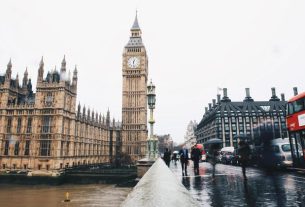(Jakarta) – The Indonesian authorities should immediately release Robison Saul, a fisherman and activist on Sangihe Island in North Sulawesi province, and quash his politically motivated conviction, Human Rights Watch said today. A court on January 17, 2023, convicted Saul under an emergency law of possessing a knife at a protest and sentenced him to nine months in prison.
The police arrested Saul, 45, on June 30, 2022, after two weeks of protests and roadblocks organized by villagers on Sangihe Island against the gold mining company PT Tambang Mas Sangihe. The company is an Indonesian subsidiary of the Vancouver-based Baru Gold Corp., which has been involved in a legal dispute in its effort to mine gold from the small island.
After his arrest, Saul spent months in pretrial detention. Police and prison officials repeatedly obstructed lawyers and family members’ access to him, and prison guards allegedly beat him repeatedly between September 28 and October 1, according to his wife and his lawyers.
“Indonesian police and prosecutors brought a politically motivated case against a local fisherman who participated in anti-mining protests, claiming a knife that is a tool of his trade somehow justifies abusive pretrial detention and a prison sentence,” said Andreas Harsono, Indonesia researcher at Human Rights Watch. “The authorities on Sangihe Island should immediately quash Robison Saul’s conviction and release him, and provide him with adequate compensation for his mistreatment.”
In January 2021, Indonesia’s Ministry of Energy and Mineral Resources granted PT Tambang Mas Sangihe a license to explore and mine approximately 420 square kilometers – an area about half the size of New York City – on Sangihe Island for 33 years. The North Sulawesi provincial government, which administers the island, also issued the company a permit.
The concession area constitutes about 57 percent of the island’s landmass and overlaps with 80 villages, according to the nongovernmental organization Jatam; it also encompasses a forest area called Sahendarumang, which serves as a water source for local residents. Most residents of Sangihe rely on farming and traditional fishing for their livelihoods.
The two licenses prompted the islanders to organize the Save Sangihe Island coalition and sue the government at the administration courts in Jakarta and Manado, the North Sulawesi capital. The islanders contended that the licenses should be revoked because they contravene Indonesia’s Marine Law, which allows issuing a mining license only on islands bigger than 2,000 square kilometers. Sangihe Island is fewer than 750 square kilometers.
In June 2022, the Manado administrative court ruled in favor of the 56 Sangihe women who had filed the petition, ordering the provincial government to revoke the permit and the company to stop their activities. Among other grounds, the court found that the mine’s environmental impact analysis did not meet legal requirements. Specifically, the assessment had failed to consult an appropriate number of residents and also failed to provide them with adequate information about all the likely environmental impacts associated with the mining operations.
In September, the Jakarta administrative high court ruled against the government, directing the Ministry of Energy and Mineral Resources to revoke the permit. But the police and the prosecutors have not carried out the ruling.
In August, the company filed a lawsuit against the Indonesian government, including President Joko Widodo and several cabinet members, seeking damages of IDR 1 trillion (US$64 million) for cancelling the project. The Supreme Court ruled against the company in January 2023.
PT Tambang Mas Sangihe has continued to move forward with its mining operations on the island. It stated in a news release that it intends to apply for a new permit, contending that: “Sangihe Island has a history of rampant illegal mining that has heavily polluted the environment, including the dumping of mine tailings into the ocean, reefs, and mangroves, and the polluting of the river and ocean with mercury. These illegal miners have had no permits and are largely not residents of Sangihe Island.”
The company announced that since October 2021 it has been clearing land, constructing waste dumps, and building a processing plant area and associated access roads. It sent bulldozers, drillers, and multiple other heavy machines to the island, moving them via 10-wheel trucks from a small port to the company’s base camp in Bowone village.
Many islanders responded to the company’s actions, which they consider to be in defiance of court rulings, by blocking the trucks.
On June 14, 2022, Saul, who had just returned from fishing, joined a peaceful roadblock set up by hundreds of villagers who were trying to stop several mining trucks that were heading to Bowone village.
Saul carried his knife, a pisau besi putih (white steel knife) commonly used by fisherman to cut nets or lines at sea, inside its pouch. A soldier prevented Saul from climbing onto a truck, and as he did so, he found the knife in Saul’s pocket. He confiscated it, and later handed it to the police.
The police kept the knife but they did not charge Saul at the time. The villagers maintained the roadblock for another two weeks and during that time, another police officer called Saul and told him to dissociate himself from the Save Sangihe Island movement. Saul refused. The police summoned him to their station on June 30, and immediately arrested him.
His lawyer, Adhitiya Augusta Triputra of the Jakarta Legal Aid Institute, said Saul was interrogated twice without any legal representative. His wife and lawyers reported they had serious difficulties in meeting with Saul in custody.
Prison officials refused to let the lawyers meet with him because the officials claimed they didn’t have permission from the Sangihe district court. Saul informed his lawyers that four prison guards beat him repeatedly inside the Tahuna prison on Sangihe Island between September 28 and October 1. The lawyers said Saul was shoved inside a bathroom, causing his head to hit the toilet, resulting in serious bleeding. The authorities failed to give him medical treatment for his injuries.
“Indonesia’s Ministry of Law and Human Rights should urgently investigate the alleged beating of Robison Saul inside the Sangihe prison as well as efforts to block his access to legal counsel,” Harsono said. “Saul’s prosecution appears intended to intimidate him and other villagers to accept a mining project that many oppose because of the serious threat to their livelihoods and way of life.”



